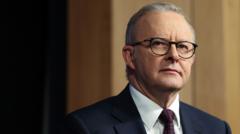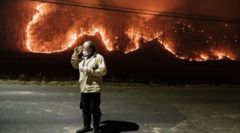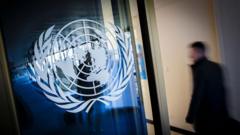A group of prominent experts, including former UN leaders, argue that the current UN climate talks are inadequate to tackle the fast-evolving climate crisis, especially in light of recent fossil fuel advocacy at COP29 in Azerbaijan. They demand reforms to ensure host countries align with climate commitments.
Experts Call for Overhaul of UN Climate Talks Amid Fossil Fuel Controversy

Experts Call for Overhaul of UN Climate Talks Amid Fossil Fuel Controversy
Key figures push for modifications to COP process, citing the urgent need to address climate change effectively.
The United Nations' Conference of the Parties (COP) climate talks are facing sharp criticism from leading experts who argue that the framework is no longer suitable for addressing the urgent climate crisis. This sentiment, voiced in a recent open letter to the UN, originated from prominent figures including a former UN secretary general, a former UN climate chief, and the ex-president of Ireland. They assert that countries hosting these crucial discussions should not support fossil fuel projects if genuine progress is to be made in the global fight against climate change.
As world leaders convened at COP29 in Azerbaijan, President Ilham Aliyev controversially characterized natural gas as a "gift from God." This remark followed reports of a senior Azerbaijani official purportedly exploiting his COP platform to explore fossil fuel agreements. The experts' letter highlights the critical need for urgent reform, noting that the slow consensus-building process among nearly 200 countries is insufficient in tackling the escalating climate emergency.
Among the signatories, former UN Secretary General Ban-Ki Moon emphasized that the existing structure of COP negotiations cannot effect the rapid transformation necessary for a sustainable climate future. Climate scientist Johan Rockström articulated a sense of urgency, noting that while there remains a chance for humanity, it hinges upon an adaptive climate policy capable of facilitating swift, large-scale change.
The COP process has made notable strides since the adoption of the Paris Agreement in 2015, which seeks to limit global temperature rise to well below 2C. However, experts are increasingly concerned about the credibility of host nations that are simultaneously advancing fossil fuel agendas. Prior to COP29, leaked audio revealed Azerbaijani officials discussing potential investments in the oil and gas sectors, raising red flags about the integrity of the discussions set to unfold.
During his address, President Aliyev not only defended Azerbaijan's gas exports but also criticized nations like France for historical colonialism and current human rights abuses, emphasizing the importance of resource extraction. This confrontational rhetoric stands in stark contrast to the inclusive dialogue typically expected at COP events, where the goal is consensus-building towards climate solutions.
Experts have observed that the representation of fossil fuel industry lobbyists often overshadows the voices of vulnerable nations and scientific communities within COP discussions. Former UN climate chief Christiana Figueres pointedly noted that without significant reforms ensuring fair representation for those most impacted by climate change, effective action remains unlikely.
The authors of the letter insist that future host countries must demonstrate substantial commitment to the principles of the Paris Agreement, advocating for more frequent and smaller COP events that enhance accountability regarding national pledges. The ongoing criticism and calls for reform signal a moment of reckoning for the COP process, challenging its ability to adapt to the drastic changes required to effectively combat climate change on a global stage.























